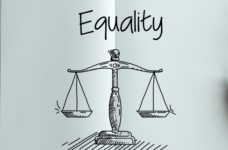Law no. 121 on Ensuring Equality was adopted in the Republic of Moldova in a regional and national context where Europeanization was the main element that mobilized the elites to adopt antidiscrimination rules. The adoption of this law, however, was merely the first step in the process of building an efficient mechanism to fight discrimination and promote equality. To ensure that the provisions of the law can turn from theoretical provisions into daily practice, it is necessary to empower the agencies mandated to enforce the law. Eight years after the adoption of Law no. 121, the LRCM report analyzes how the Equality Council and the courts of law interpret and apply the law, the relationship between various actors, and the opportunities and risks which emerged or are foreseeable.
The Equality Council has grown impressively, and its achievements are due to a large extent to its team. Their passion helped the organization to cope with the lack of resources and to overcome challenges in a transparent and open way. The organization managed to foster dialogue with the society by issuing individual and general recommendations, developing bold case law on sensitive subjects, and taking the lead in sounding the alarm when the public discourse swerved toward hatred and assaults on dignity during election periods and in times of crisis. The Council also proved its worth by acting as a mediator, coming up with general recommendations that offered systemic solutions to some forms of structural discrimination.
The analysis also highlights the risks—triggered by the Council’s limited mandate—in granting efficient remedies as, despite the Council’s power to find acts of discrimination, it cannot punish them. Instead, it has to refer notices of contravention and case files to competent courts of law, which perform a new examination and establish sanctions in light of the Contravention Code. This detour takes time and energy, and sometimes, courts have a poor understanding of the antidiscrimination law as a special law. Another identified risk was that the Council risks losing independence and efficiency because of insufficient resource allocation or the risk of politization due to attempts to make the Council a tool in political strife. Unfortunately, deficiencies in applying the procedural guarantees when issuing Council decisions have often led to the annulment of these decisions by the courts. An unexpected finding concerned the way some judges viewed the Equality Council and their ambiguity regarding its legal status as an administrative-jurisdictional authority, which lead them to take an incorrect and uncooperative stance, as they did not understand the importance of an efficient and loyal cooperation between institutions meant to protect the rule of law.
One of the key elements that can render the application of Law no. 121 meaningful consists in the mandate vested in the courts and their efficient involvement in following the spirit and the letter of the law. While being still in its early stage, the examined case law shows that courts gradually improve their ability to apply the antidiscrimination law. Still, there are some discrepancies caused by judges’ poor understanding that the antidiscrimination law has the status of special law (lex specialis) and there are significant difficulties in aligning, or even failure to align, with international—particularly the ECtHR’s—practice when courts are asked to assess the balance between freedom of expression, on the one hand, and the prohibition of discrimination and protection of equality, on the other hand. The rigid legal interpretation and lack of understanding of the special law status ensured to Law no. 121 also transpire in many instances where courts annul the Council’s decisions, particularly on procedural reasons, with a superficial analysis of the merits and with no analysis of the potential impact their judgments have on victims of discrimination. Another issue concerns judges’ misunderstanding of the Equality Council’s role and of its relationship with courts, including the allegations that the Council interferes with justice or judicial independence by examining complaints against courts or judges, whereas in fact the Equality Council simply carries out its legal mandate. This can be explained by the failure of the National Institute of Justice to provide and regularly assess training and workshops to bring Moldovan judges up to date with the international case law on discrimination, incitement to discrimination, harassment, reasonable accommodation, and accessibility.
Latest court judgments give reasons for optimism as they show the understanding of the need to correlate remedies to the discriminatory deeds and a greater flexibility in establishing sanctions. In the long run, this approach will help to define an efficient mechanism of remedies for cases of discrimination.
In terms of the areas in which discrimination occurs, a greater part of cases brought before both the Equality Council and the courts of law concerned discrimination in the field of employment, and fewer cases are of discrimination in access to education or healthcare. Even in the absence of officially filed complaints, the Equality Council may perform the proactive role of monitoring certain fields strategically and take ex officio action to educate and encourage victims to initiate litigation. Unfortunately, despite its mandate under Article 13 of Law no. 121, the Council hesitates to act ex officio.
The analysis focused on the adequacy of procedures, the effectiveness and impact of remedies for victims of discrimination, as well as the educational role of provided remedies for the community. Finally, the analysis proposes a series of specific recommendations in order to improve existing legislation and practices.
The ”Analysis of the Practice of Courts of Law and of the Equality Council concerning Equality and Non-discrimination in the Republic of Moldova” was developed by Romanița IORDACHE, expert on equality and non-discrimination, within the project ”Promoting rule of law through civil society oversight”, implemented by the LRCM with the support of the U.S. Agency for International Development (USAID).

